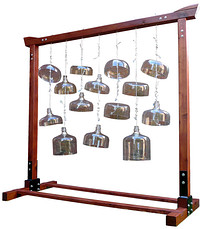
There is only one composer who would write about ”Visions of a Defeated basketball Team in the Shower Room” and score the work with instruments called the Surrogate kithara or the Boo. His name is Harry Partch (1901 - 1974) and is a pivotal figure in the development of twentieth century music due to the steadfast pursuit of his original ideas. The Bewitched: a Dance Satire is an excellent showing of what Harry Partch (left) has to offer. It is seventy-five to eighty

minute work for Solo Soprano,
Piccolo, Clarinet, Bass Clarinet, Cello, Kithara II, Harmonic Canon II, Koto, Surrogate kithara, Chromelodeon I, Cloud-Chamber Bowls (ri
ght), Spoils of War, Diamond Marimba, Boo, Bass Marimba, and Marimba Eroica.
Partch’s music is unique as it is based on his own system of just intonation and microtonality that are achieved with original instruments built by Partch himself.
The work provides background music for dancers, yet the musicians themselves are on stage and essential to the drama. The Bewtiched is organized in ten scenes, each with a programatic title, bookended by a Prologue and Epilogue. In the Prologue, as Partch describes in a 1959 introduction to a WNYC broadcast of The Bewitched, a musician wanders on stage, seeming lost among the huge percussion instruments made by Partch. After beginning to play one of the percussion instruments, the other musicians wander out one by one and join the beat. Together they get lost in their own power. An ancient witch appears and calls the ten scenes forth:
- Transfiguration of American Undergrads in a Hong Kong Music Hall
- Permutation of Exercises in Harmony and Counterpoint
- Inspired Romancing of a Pathological Liar
- Alchemy of a Soul Tormented by Contemporary Music
- Visions of a Defeated basketball Team in the Shower Room
- Euphoria on a Sausalito Stairway
- Transmutation of Detectives on the trail of a Culprit
- Apotheosis of a Court in its Own Contempt
- A Political Soul Lost Among the Voteless Women of Paradise
- Demonic Descent of the Cognoscenti While Shouting Over Cocktails
I found listening to this work to be a moving experience. I connected with the music on a primitive level through the honesty and pureness of its expression. The music seemed to be expressing to me the basis of music in humanity. Far from simplistic, the music is full of definite textural characters that interact in a balanced and natural way. The microtonality sounds organic and intrinsic, and the rhythms ritualistic. I can imagine a live performance of The Bewitched would be an incredible experience as all the elements of music, dance, and theater are essentially intertwined in a way that strips away the layers and conditioning put on by millennia of human culture, which is exactly what Partch intended. The Bewitched is about how we are all bewitched by superficiality of our lives and unable to truly see our surroundings. Viewed in this vein, the titles of of the individual scenes go from from appearing frivolous and random to being a poignant and pertinent commentary on the state of human values.
I feel that The Bewitched should be included in the canon of western art music as it is a well balanced, clearly expressive work that is relevant to the musicality intrinsic in humans. I believe that it is not in the canon for two reasons. First being the extraordinary commitment that is required of many people to stage this work combined with the requirement of the rare instruments designed and made by Partch that are hard to acquire. Second, being how this work questions what is art and how we experience art. The primitive nature of this experience, as well as the microtonality would likely be uncomfortable for many.
In researching, The Bewitched and Harry Partch, I feel that I am just beginning to scrap the surface of a realm of musical thought that I have yet to entertain.
1 Partch, Harry, Genesis of Music (New York: Da Capo Press, 1974), 334
No comments:
Post a Comment